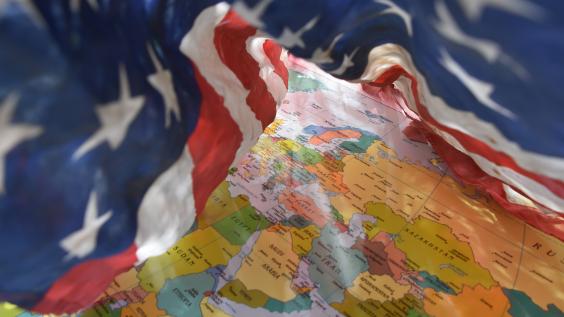Back to Iraq? U.S. Interests and Opportunities in an Environment of Reduced Expectations

Table of Contents
Author(s)
Share this Publication
- Download PDF
- Print This Publication
- Cite This Publication Copy Citation
Krane, Jim. 2014. Back to Iraq? US Interests and Opportunities in an Environment of Reduced Expectations. Issue Brief no. 10.13.14. Rice University’s Baker Institute for Public Policy, houston, texas.
Introduction
As the United States once again ramps up involvement in Iraq, it makes sense to examine US interests and strategy while considering what might constitute realistic parameters for participation and outcome.
Three factors should focus strategic thinking on the issue.
First, our legacy in Iraq is poor. The dramatic inroads of Sunni Muslim extremists in Iraq have come despite, or perhaps because of, nearly 10 years of deep US involvement in the country, at a cost of thousands of Iraqi and American lives.
Second, success in the current counterinsurgency mission is far from guaranteed. Even if the US-led coalition manages to defeat and disperse the Islamic State or ISIS militants, instability in Iraq and Syria is likely to continue. The splintering of Iraq into sectarian enclaves and even the eventual demise of the Iraqi nation-state remains a possibility.
Third, America’s enthusiasm is low. It is unrealistic to expect another major commitment to nation-building in Iraq, let alone Syria. Therefore, Washington needs a sustainable longer-term strategy for managing the issue of extremist-driven instability in and around Iraq. Since Washington brought down the previous regime in 2003, we bear some responsibility for the current debacle. Deploying US air power in support of regional ground forces seeking to dislodge ISIS fits within this mandate. Beyond this, what are US interests in Iraq and how are they best pursued?
U.S. Interests in Iraq
US priorities in Iraq and the wider Middle East start with an interest shared by most of the world: the free flow of Iraqi crude to world markets, since oil is such a crucial component of the global economy.
Beyond energy considerations, Washington still hopes for a unified, stable, and democratic Iraq that is integrated in a peaceful way with its neighbors, and that cooperates against groups and ideologies hostile to America and its interests. These goals depend on Iraq developing the capacity to secure and control its own territory and to protect its borders from external threats.
Figure 1 — Iraqi Oil Production Since 1965 (M B/D)

What if Iraq cannot develop institutions consistent with inclusive and effective governance and instead slides further into chaos?
In that case, US interests then shift toward preventing the turmoil from spreading and undermining the stability of neighboring states or their ability to carry out their own hydrocarbon exports.
Since America is unwilling to mount another major military and diplomatic nation-building effort in Iraq, the best we can do is to help the beleaguered state develop the tools for survival while preparing the surrounding region for the event that Iraq fails.
Those preparations would mark a return to “containing” the conflict. It would mean bolstering regional border and infrastructure security, as well as providing military and intelligence cooperation and other assistance to our regional allies. A containment policy would also build on the current efforts to weaken and isolate rebel-held areas in Iraq and Syria, sealing them off from smuggling traffic and roving militants while buying time for the government in Iraq (and less directly Syria) to reassert control.
Figure 2 — Iraq Oil Exports Including Shares From Northern and Southern Iraq (M B/D)

The Risks to Energy Markets
Iraq’s role in global energy supply is the thread that tethers the country most closely to the outside world and that represents its promise as a large future contributor. Iraq has played a strategic role in oil markets since the Kirkuk field was discovered in 1927. Of course, Iraq’s zig-zagging output has also contributed to market instability, especially its prolonged periods of low production during its 1980–88 war with Iran and in the aftermath of its 1990 invasion of Kuwait, when it was under UN embargo. (See Figure 1.) Iraqi production dropped to its recent low of 1.3 million barrels per day during 2003, the year of the US invasion, but has recovered steadily since then, topping 3m b/d in 2012.
Iraq’s large and low-cost resource base serves to fuel expectations that it will remain an important supplier in the future. Given rising doubts about Saudi Arabia’s ability to maintain current export levels over the long term, Iraq represents a strong alternate candidate for a key growth supplier role that would keep world markets supplied. For now, the notion that Iraq might assume that responsibility sounds farfetched. Iraq has been such a fickle supplier over the years that global oil prices are said to include a risk premium that accounts for the likelihood of an Iraqi outage.
Fraught relations between Baghdad and the Kurdish minority in the northeast, especially over natural resource ownership, have exacerbated uncertainties. When ISIS routed Iraqi security forces from Mosul, Kurdish peshmerga forces seized nearby Kirkuk, the northern Iraqi oil center, to which the Kurdish Regional Government in Erbil lays claim.
Since April, Iraqi exports via the Northern Pipeline from Kirkuk to Turkey have come to a halt, to little surprise or reaction from markets. Those exports typically represent anywhere from 200,000 barrels per day to as much as double that, roughly 10% to 20% of the country’s overall export trade, as Figure 2 shows. Most of Iraq’s exported crude flows from the big oilfields in the solidly Shiite and more stable south. Southern Iraq crude is exported directly from two terminals in the Persian Gulf.
A disruption of the flow from southern Iraq, although unlikely, could remove more than 2 million barrels a day from global markets, potentially provoking a serious supply shock. Any increase in prices would depend on the ability of other producers to offset the loss. For now, that capacity is questionable. Iranian exports remain constrained by sanctions.1 Libya’s stop-start output has been too erratic to predict. Saudi Arabia, meanwhile, has already been producing at historically high levels, leaving it with little spare capacity. On the other hand, the unexpected growth in US shale oil production has displaced a large share of US demand for crude imports, which has provided much needed slack in otherwise tight crude markets.
Background: Containing Iraq
For most of the past 40 years, Americans have perceived Iraq as an adversary and sought to “contain” its role in the region.2 US policy toward pre-2003 Iraq focused on countering its ambitions to expand its sphere of influence and territory while undermining its pan-Arab rhetoric and hawkish role in OPEC. In particular, Iraq’s invasion of Kuwait triggered the First Gulf War of 1990–91 and a strident containment policy that included trade restrictions and no-fly zones.
The US invasion and occupation of 2003 represented a dramatic shift in US strategy. Rather than containment, Washington invested huge sums and efforts in hopes of launching a “new Iraq.” The end goal was to inaugurate a stable, oil-exporting democracy that would act as a model for reform in the region while shedding its threatening posture toward Israel, Kuwait, Iran, the Kurds, and the Gulf monarchies.
Figure 3 — Iraq’s Oil Infrastructure

The Obama administration’s pullout eight years later served to acknowledge that some of those goals would not be achieved. On the one hand, Iraq did succeed in restoring oil exports, albeit below expectations. And America was able to defeat the Iraqi army and neutralize the threat it posed to US allies in the region. However, this Pyrrhic victory wound up undermining the rest of the US mission. Rather than becoming a peaceful democracy, Iraq’s descent into civil war provided the region with a stark example of the downside of democracy. The chaos within Iraq’s borders rendered the country, yet again, a threat to the region.
A weak Iraqi state is in no one’s interest. Relinquishing territory to ISIS has allowed the extremist group to try its hand at governance while attracting like-minded followers. Although ISIS does not appear to have ambitions outside the immediate region, the empowered group now poses an indirect threat to countries beyond Iraq and Syria, including those whose residents return home after undergoing extremist indoctrination. It is clear that defeating ISIS is a prerequisite for the longer-term project of building a viable and legitimate Iraqi state.
Conclusion: Inclusion, Legitimacy, Security
The United States still maintains important interests in and around Iraq. Even so, there are few expectations that Washington can launch another major commitment to Iraq, given America’s poor track record and diminished appetite for deep involvement. The best the Obama administration can achieve by bombing ISIS is to give the Iraqi government time to push reforms that lead to increased participation by Sunnis, Kurds, and other minorities and re-extend its governance.
Since success is not assured, we should be ready to contain Iraq once more. Not by imposing sanctions and a no-fly zone as after the First Gulf War, but by insulating Iraq’s neighbors against the further spread of unrest. While we would still like to see Iraq become an inclusive and stable democracy, we need to prepare for the possibility that it does not.
Endnotes
1. A sustained rise in oil prices could also heighten pressure on Washington to come to terms with Iran on the nuclear dispute and allow Iran to maximize its oil output.
2. With some exceptions, such as the Reagan administration’s tilt toward Iraq during the Iran-Iraq war of 1980–88.
This material may be quoted or reproduced without prior permission, provided appropriate credit is given to the author and Rice University’s Baker Institute for Public Policy. The views expressed herein are those of the individual author(s), and do not necessarily represent the views of Rice University’s Baker Institute for Public Policy.



